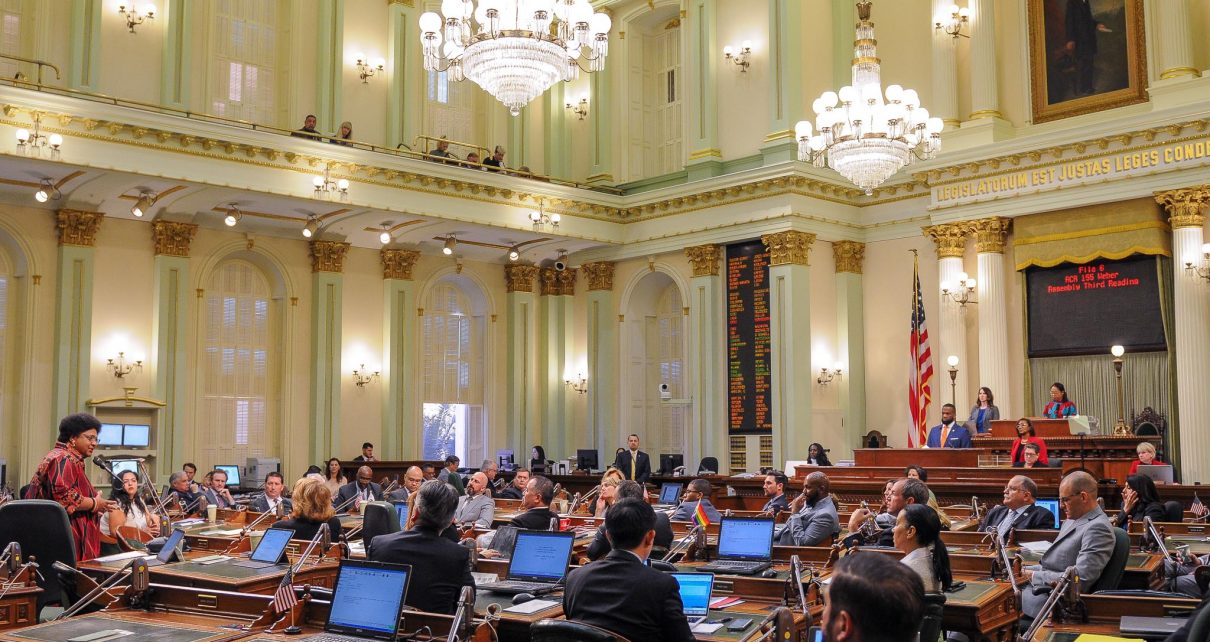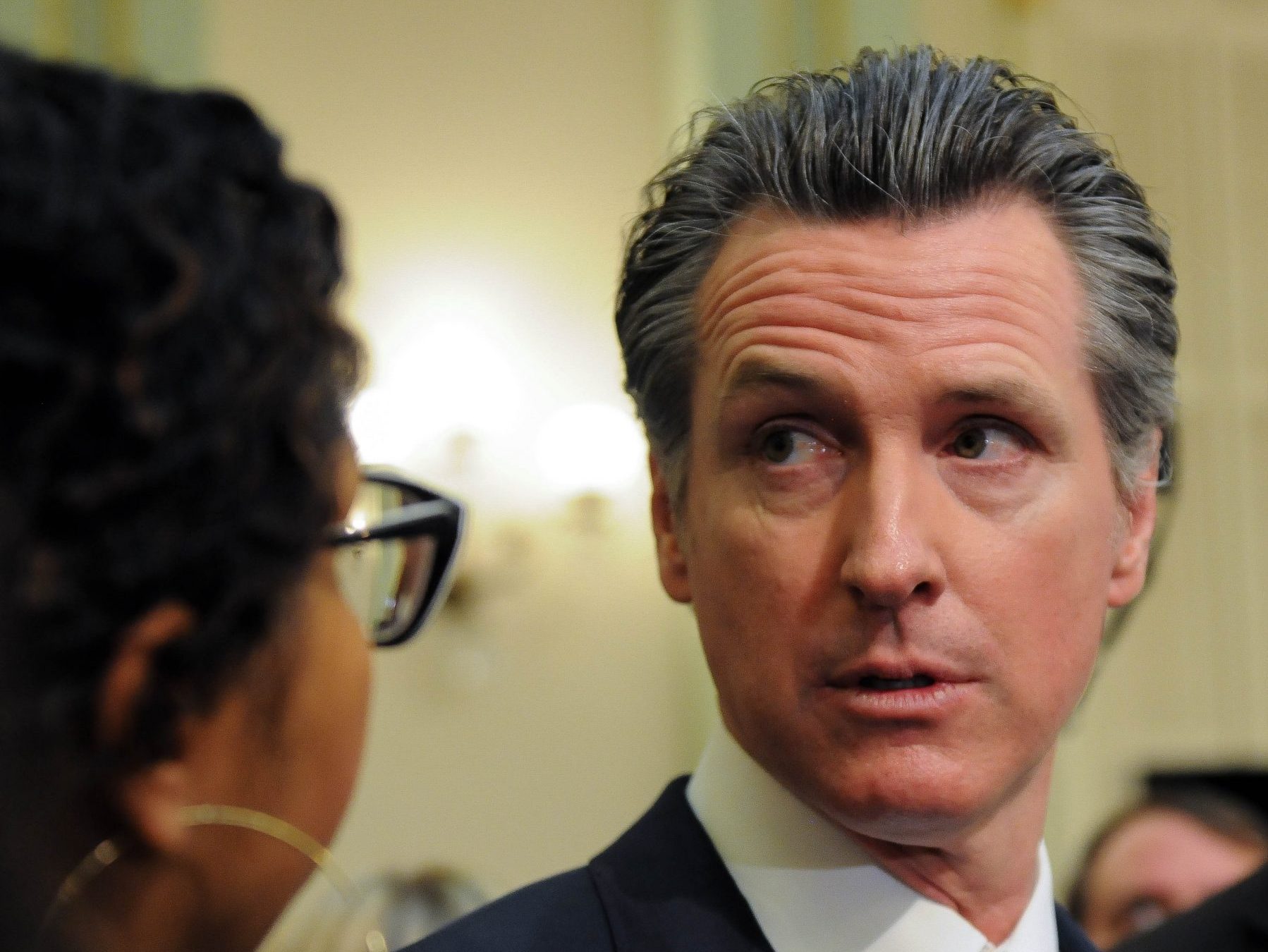
California State Assembly in Session. (Photo: Kevin Sanders for California Globe)
California Governor and Legislators Suspend Procedures and Rules to Pass Emergency $500 M to $1 Billion Coronavirus Funding
CA Legislature authorized funding, then adjourned until April 13
By Katy Grimes, March 17, 2020 11:04 am
The California Legislature passed emergency funding Monday providing $500 million to be used to combat COVID-19, and authority for total expenditures up to $1 billion to the Governor. There were no Assembly or Senate Budget Committee hearings, and the Proposition 54 rule that a bill must be in print 72-hours was bypassed.
How was this done?
The Governor’s announcement cited Article 13B, Section 3(c)(2) definition of emergency in the California Constitution, which exempts appropriations from spending limits and waives the 72-hour bill-in-print requirement, in the event an emergency is declared. Gov. Newsom asked the Legislature Monday to pass the emergency funding, based on his March 4 declaration of a State of Emergency.
Because there is no more California Channel to broadcast the live floor sessions of the Assembly and Senate, unless the average citizen knows how to access the live video of the Legislature in session, and knows which of the 100 budget trailer bills was being gutted and amended for this funding, there was little to no transparency in the passage of the $500 million to $1 billion of emergency funding to fight COVID-19.
While the gutted and amended budget bills had bipartisan support, this was done with almost no public notice. The bills were posted at 2:30pm Monday, but again, the average citizen would need to know to check the Assembly and Senate websites in anticipation of emergency legislation, and guess which bills were being gutted and amended. Both houses caucused with their parties all afternoon and didn’t vote on the bills until the early evening.
In addition to the Legislature approving up to $1 billion in new spending on the coronavirus outbreak, they also approved suspending their own work until April 13.
Last week after Judiciary Chairman Jerrold Nadler (D-N.Y.) told his Democratic colleagues they should leave Washington and return home to their districts where they would be safer, House Speaker Nancy Pelosi said she would not shut down Congress. “We are the captains of the ship. We are the last to leave,” Pelosi told her caucus, the Hill reported.
California legislators could still do their jobs and run skeleton crews in their offices, and be in the Capitol one day a week – especially now that they have authorized $500 million available immediately, and allowed Gov. Newsom to spend up to $1 billion.
Assembly Budget Committee Vice Chairman Jay Obernolte (R-Hesperia) addressed the passage of the emergency budget bills:
“By taking the actions we did today, we are placing an extraordinary degree of trust in Governor Newsom. However, these are extraordinary times and it makes sense to empower him to act quickly and expedite the funding necessary to mitigate this crisis. The funding provided in this bill is critical to stopping the spread of this illness, to preserving our economy, and most importantly, to saving the lives of Californians.”
Senate Republican Leader Shannon Grove (R-Bakersfield) also issued a statement about the Senate’s passage and Republican support of Senate Bill 89 and Senate Bill 117 “which will provide additional funding to help assist the fight against COVID-19 and provide funding for the massive school closures.”
“This is a first step, but Senate Republicans are also committed to addressing the other negative effects of COVID-19 on businesses, employees, and independent contractors.
The Legislature also passed Senate Bill 117 to provide $100 million in funding to the public school system to remain fully funded while schools have had to shut down, and to give schools money for cleaning and disinfecting their facilities.
The Johns Hopkins Coronavirus dashboard shows 11 deaths in the U.S., with 5,702 total confirmed cases.
Here is CALIFORNIA CONSTITUTION, ARTICLE 13B, SECTION 3:
The appropriations limit for any fiscal year pursuant to Sec. 1 shall be adjusted as follows:
(a) In the event that the financial responsibility of providing services is transferred, in whole or in part, whether by annexation, incorporation or otherwise, from one entity of government to another, then for the year in which such transfer becomes effective the appropriations limit of the transferee entity shall be increased by such reasonable amount as the said entities shall mutually agree and the appropriations limit of the transferor entity shall be decreased by the same amount.
(b) In the event that the financial responsibility of providing services is transferred, in whole or in part, from an entity of government to a private entity, or the financial source for the provision of services is transferred, in whole or in part, from other revenues of an entity of government, to regulatory licenses, user charges or user fees, then for the year of such transfer the appropriations limit of such entity of government shall be decreased accordingly.
(c) (1) In the event an emergency is declared by the legislative body of an entity of government, the appropriations limit of the affected entity of government may be exceeded provided that the appropriations limits in the following three years are reduced accordingly to prevent an aggregate increase in appropriations resulting from the emergency.
(2) In the event an emergency is declared by the Governor, appropriations approved by a two-thirds vote of the legislative body of an affected entity of government to an emergency account for expenditures relating to that emergency shall not constitute appropriations subject to limitation. As used in this paragraph, “emergency” means the existence, as declared by the Governor, of conditions of disaster or of extreme peril to the safety of persons and property within the State, or parts thereof, caused by such conditions as attack or probable or imminent attack by an enemy of the United States, fire, flood, drought, storm, civil disorder, earthquake, or volcanic eruption.
(Subdivision (c) amended June 5, 1990, by Prop. 111. Res.Ch. 66, 1989. Effective July 1, 1990. Other Source: Entire Sec. 3 was added Nov. 6, 1979, by Prop. 4; initiative measure.





One thought on “California Governor and Legislators Suspend Procedures and Rules to Pass Emergency $500 M to $1 Billion Coronavirus Funding”